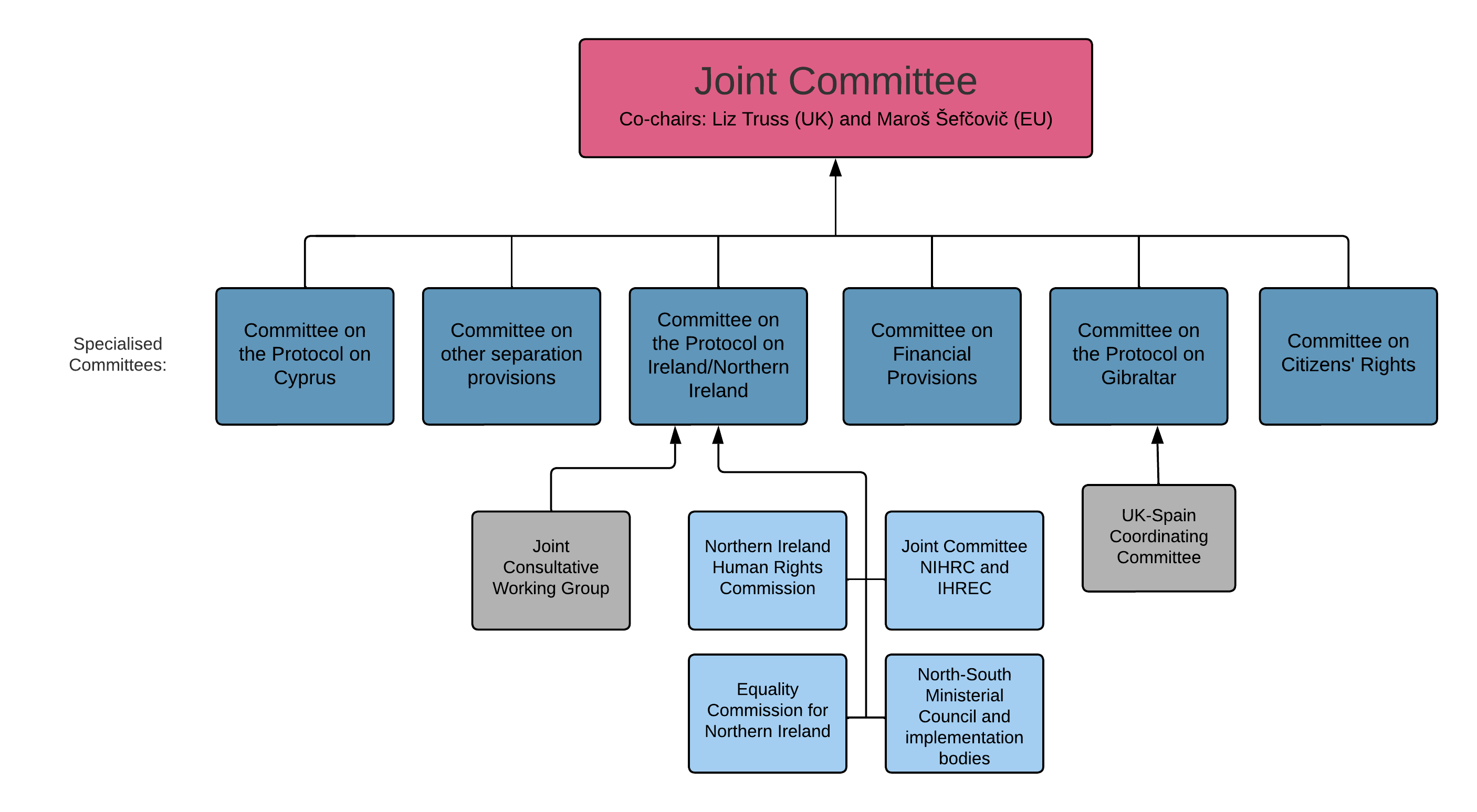Brexit & Beyond Newsletter
7 June 2022

Welcome to the 7 June 2022 Brexit & Beyond newsletter
The UK Parliament has returned from recess and the UK Government is this week expected to publish legislation to change the Protocol on Ireland/Northern Ireland. The Government’s response to a Lords committee report on the Protocol has been published. Today’s newsletter also includes news on legislative scrutiny of the Protocol, the UK Procurement Bill, and the UK’s access to the EU’s Horizon programme.
UK Protocol legislation expected this week
Yesterday, the UK Parliament returned from recess. Legislation announced by Foreign Secretary Liz Truss to change the Protocol on Ireland/Northern Ireland is expected later this week. It remains to be seen whether the Bill will give Ministers powers to disapply certain Protocol provisions in the future, or whether the Bill, once passed, will immediately disapply these provisions. The Commons Library has published a research briefing on the Protocol on Ireland/Northern Ireland, covering how it has been implemented, the temporary grace periods, EU-UK negotiations in 2021 and 2022 on possible changes to the Protocol, and the UK Government’s announcement that it will legislate to override the Protocol.

UK Foreign Secretary Liz Truss on a recent visit to Northern Ireland | Source: UK Government/FCDO, Simon Worth
RTÉ reports that the response from the EU to the legislation will be “firm and calibrated to what the UK are doing”. This could include unfreezing legal action previously initiated when the Government took unilateral action, potentially with new infringement proceedings, or trade measures. Tony Connelly also reports that the EU has “further concessions in reserve” if the UK properly engages with the EU’s October 2021 proposals on medicines, customs, SPS measures, and engagement with Northern Ireland stakeholders. The EU has declined the Foreign Secretary’s proposal for a meeting of the EU-UK Joint Committee.
Sir Jonathan Jones QC, former head of the Government Legal Service, has published an article on the legal basis for the Government’s action on the Protocol. Former Prime Minister Tony Blair has urged the EU and UK to show “maximum flexibility” to reach an agreement. A paper from his think tank sets out proposals for resolving the Protocol dispute which “would require significant movement from the EU on its stated position around the protocol’s interpretation.” In a no-confidence letter to the Prime Minister, Former Treasury Minister Jesse Norman said breaching the Protocol “would be economically very demanding, politically foolhardy and almost certainly illegal.”
The Belfast Telegraph has published the results of an opinion poll which finds that 76% of those who voted for the DUP, UUP, or TUV say the DUP shouldn’t return to Stormont until the Protocol is “removed completely” or “significant changes” made to it. Tomorrow (Wednesday 8 June) the Lords Sub-Committee on the Protocol will hear evidence from Doug Beattie (UUP) at 3.10pm and Sir Jeffrey Donaldson (DUP) at 4.10pm. This follows previous sessions with Sinn Féin, Alliance and the SDLP.
Scrutiny by MLAs
While the Assembly is not carrying out its normal business, MLAs can continue to submit written questions to departmental Ministers, who remain in place. This reflects the changes made in the Northern Ireland (Ministers, Elections and Petitions of Concern) Bill: Ministers can remain in office following an election for up to 24 weeks, and for up to 48 weeks if the First or deputy First Minister stop holding office. Written questions to Ministers can be viewed on the Assembly website. Ministers have 10 working days to respond; for priority questions, an answer can be sought within 2-5 working days.
Another motion has been filed by People Before Profit MLA Gerry Carroll to recall the Assembly. It requires the support of at least 30 MLAs.
UK Government on legislative scrutiny of the Protocol
The UK Government’s response to a report from the Lords Sub-Committee on the Protocol on Ireland/Northern Ireland was published on 31 May. The Committee’s report considered scrutiny of EU legislative proposals within the scope of the Protocol. The Government considers the arrangements set out by Lord Frost in September 2021 to be “appropriate and proportional” for scrutiny of new EU legislation under the Protocol i.e. the Government will continue the submission of Explanatory Memoranda on EU proposals which amend or replace existing proposals that fall under scope of the NI Protocol (including tertiary legislation) and new EU proposals falling under the scope of Protocol when agreed by the Joint Committee.
In its report, the Committee stated, “given the implications for Northern Ireland and its relationship with the UK, we stress the continuing importance of effective scrutiny of EU legislative proposals by Committees in the House of Commons and the Northern Ireland Assembly…we stress in particular the importance of timely provision of necessary information to Assembly Committees, including Explanatory Memoranda, either by the Government or the Northern Ireland Executive”. In response, the Government says, “In respect of scrutiny by the Northern Ireland Assembly’s Committees, the Government will continue to share Explanatory Memoranda (EMs) submitted to the Sub-Committee with Northern Ireland Executive officials to inform the work of the Assembly Committees, and the Government will continue to involve Executive officials in the preparation of EMs provided to the Sub-Committee on EU legislation applying to Northern Ireland before they are submitted.”
The Government says that while the EU has not formally notified the UK of the adoption of any new EU legislation within the scope of the Protocol, it has preliminarily notified the UK that it considers the proposed Carbon Border Adjustment Mechanism (CBAM) to be within the Protocol’s scope. The EU’s CBAM will introduce a carbon price on certain products imported into the EU. A report from the Commons European Scrutiny Committee has considered CBAM’s implications.
The Committee’s report contained recommendations relating to transparency and engagement with the Joint Consultative Working Group (JCWG). The JCWG is to “serve as a forum for the exchange of information and mutual consultation”, including in relation to the implementation of EU law in Northern Ireland, and amendments or replacements to applicable EU legislation. The Government says it continues to reflect in discussions with the EU the rules of procedure of the group: the meetings are confidential.
Under Article 2 of the Protocol, the UK Government committed to “no diminution of rights, safeguards or equality of opportunity” in Northern Ireland post-Brexit. The Government says it is working with the Equality Commission for Northern Ireland (ECNI) and the Northern Ireland Human Rights Commission (NIHRC), which monitor this commitment, “to ensure the processes and structures are embedded appropriately”. It states there has been “contact between the Commissions and the UK Government officials who service the UK’s JCWG representatives, and we expect this to continue”, in line with the governance mechanisms of the Protocol.

Governance structure of the Withdrawal Agreement. Read more about this on our website.
Regarding engagement and input from Northern Ireland, the Government says it “has been taking forward additional discussions with the EU to consider how to improve the involvement of Northern Ireland stakeholders and institutions in the operation of the Protocol…We need to see much more ambition from the EU to engage on the changes necessary to give Northern Ireland institutions and stakeholders a meaningful role in shaping the rules applicable in Northern Ireland.”
The Sub-Committee updates on a weekly basis its correspondence with Government Ministers on EU legislation which will apply to Northern Ireland under the Protocol.
EU Standardisation Strategy
The Commons European Scrutiny Committee has published its second report of this session, which considers the EU Standardisation Strategy. It seeks further clarification on how the EU proposal may affect the position of the British Standards Institution (BSI) in Europe. Furthermore, it notes that “substantive divergence of regulations between the EU and Northern Ireland on the one hand and Great Britain on the other is increasingly likely: the EU is considering changes to its legislation relating to general product safety, machinery and construction products, all of which are applicable in Northern Ireland under the Protocol.” The report includes a list of the types of goods and services for which harmonised standards are used under EU law, and indicates which of the laws continue to apply in Northern Ireland.
Other news
- The UK Government has introduced the Procurement Bill to Parliament, which, it says, “will tear up hundreds of complicated and bureaucratic EU rules and replace them with a single, simple and flexible framework for securing public sector contracts.” Changes in the Bill will apply to all public sector bodies. The Bill has passed the second reading in the House of Lords. The Bill will apply in England, Wales, and Northern Ireland and legislative consent will be sought from the Assembly and Senedd Cmyru. Scotland has decided to remain outside the framework.
- A legal challenge to the decision by DUP Minister for Agriculture, Environment and Rural Affairs Edwin Poots to stop checks (under the Protocol) at Northern Ireland’s ports has been halted. There are claims that the Minister’s department may not be required to carry out these checks and that the responsibility may lie with the UK Government.
- The Scottish Parliament has published a briefing on the Scottish Government’s approach to alignment with EU law. In May, the Scottish Government laid an updated draft statement of policy and an annual report on this policy.
- Universities UK has called for a quick resolution to the dispute regarding the UK’s access to Horizon Europe, the EU’s funding programme for research and innovation. The group describes the situation as "close to the precipice." EU Ambassador João Vale de Almeida has said access to Horizon is “collateral damage” in the fall-out over the Protocol on Ireland/Northern Ireland. The Protocol does not cover Horizon so universities in NI are also missing this funding.
- The Irish Times reports on shortages caused by the ban on import of seed potatoes to Ireland from the UK. Post-Brexit rules mean that the UK is considered a third country and SPS rules prohibit their import.
- The Senedd has published an article, ‘Beyond the Brexit headlines: UK and EU parliamentarians discuss future cooperation’, which considers the inaugural meeting of the EU-UK Parliamentary Partnership Assembly, established in the UK-EU Trade and Cooperation Agreement (TCA).
- The Commons Business, Energy and Industrial Strategy Committee has launched an inquiry into the UK’s labour market. It will consider the impact of Brexit on the flow of workers into and out of the UK. The call for evidence closes on 8 July. The number of EU-born workers in NI has fallen by 19,000 since 2016.
- The UK has signed a trade and economic Memorandum of Understanding with Indiana.



